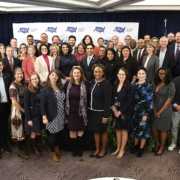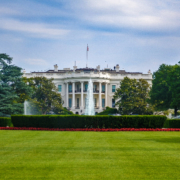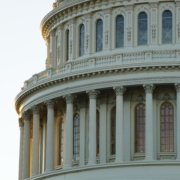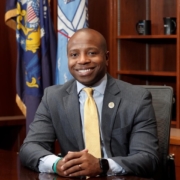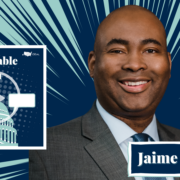Deep Dives on Policy and Advice on Winning Elections at NewDEAL Gathering
The Well News | Deep Dives on Policy and Advice on Winning Elections at NewDEAL Gathering
By Dan McCue
For the more than 150 center-left Democrats gathered in a large conference room at the Dupont Circle Hotel on Thursday morning, the annual gathering of NewDEALers in the nation’s capital was more than a chance to break bread with like-minded state and local officials.
Always an opportunity for members to swap ideas and tales of adventures on what NewDEAL CEO Debbie Cox Bultan described as the “front lines” of governance, the start of this year’s conference — the group’s 13th — also felt something like a call to arms ahead of the 2024 elections.
“It’s hard right now, it really is harder than any time in my 30 years in politics,” Bultan said during her opening remarks on Thursday.
“The pace of change, economic uncertainty, division at home, war and human suffering abroad. All of this is really leaving people scared and vulnerable,” she continued.
“And now we’ve got extremist forces, which have literally taken over one of our major political parties, stoking those fears by escalating the politics of cynicism, politics of division and chaos, and attacking our very democracy,” she said.
Bultan admitted in the face of all this — not to mention the challenges the nation faces due to climate change, the development of AI and other new technologies and a persistent “opportunity gap” that leaves many Americans behind — she sometimes feels “overwhelmed and alone.”
“But as I look around this room today, I’m reminded that we are not alone; nor are we powerless,” she said. “And honestly, my confidence is restored … confidence in the belief that pragmatic, results-oriented politics that delivers for the American people will ultimately win the day.”
Toward the end of her remarks, Bultan said two core beliefs have been a constant for her throughout her life in politics.
“These are my North Stars, if you will,” she said. “The first is that ideas matter. … The second is that leadership matters.”
Both are at the core of why NewDEAL was founded in 2010.
The founders were Bultan, who, among other things, had spent 15 years at the Democratic Leadership Council, a nonprofit dedicated to shifting the Democratic Party away from the leftward turn it had taken since the late 1960s, and Helen Milby, founder and president of Helen Milby & Co., a fundraising and nonprofit consulting firm.
They were joined in their effort by the organization’s first co-chairs, then-Gov. Martin O’Malley, of Maryland, and Sen. Mark Begich, of Alaska.
Then, as now, the idea was that NewDEAL would scour the country and “lift up” the best and brightest young Democratic leaders, potentially preparing them to run for national office, but more typically, supporting and highlighting the pragmatic work they were doing for their constituencies.
The “DEAL” in the group’s name stands for “developing exceptional American leaders.” It’s highest profile success in this regard is former South Bend, Indiana, Mayor Pete Buttigieg, who ran a spirited race for president in 2020 and who is now Transportation secretary in the Biden administration.
This year, with control of the White House, Senate and the House of Representatives all up for grabs, NewDEAL is rolling out what it calls its “2024 Freedom Agenda.”
“At the end of the day, politics is really a battle of ideas,” Bultan said. “It’s critical that we remind voters that Democrats are the defenders of freedom and that includes not only the freedom to make deeply personal decisions without the interference of government, but also the freedom to live the American dream, to participate in our democracy, as well as to feel safe and secure and welcome in every corner of our country.”
She went on to say she believes the agenda will resonate because “Americans will always vote for something, not against something.”
Mark Riddle, president of Future Majority, a “strategy and creative” center, was one of the early key advocates for the freedom-focused agenda.
He came to the idea, he said, after some deep soul-searching and many extended conversations with “some very smart people” in the wake of the 2016 presidential election.
“The thing we kept coming back to was the idea that we needed to rebuild what the “D” meant to people as they walked into the ballot box,” Riddle said.
“The reality is, most people don’t know the candidates very well when it comes time to vote,” he said. “They know who is running for president. They’ll know who is running for U.S. senator. But, you know, most people, voting for their House member, won’t even know who is running for the House in the next district over.”
Riddle said “landing” on the concept of freedom occurred after a lot of “research and homework” after Future Majority was founded in 2017.
“For years and years and years while working on campaigns, I saw Republicans use the word ‘freedom’ as a wedge in regard to anything it was humanly possible to attach a connotation to,” he said. “And then one day, we were like, ‘Well, let’s take that back.’
“And when you think about it, freedom, like the concept of getting a ‘fair shot,’ is in the DNA of Democrats,” Riddle continued. “Then, as we continued to look at this, we also started thinking about how all elections are about the future.
“President Clinton, who we all used to work for … always used to talk about how elections were about the future,” he said. “So we started putting these three words together, ‘freedom,’ ‘fair shot’ and ‘future’ and we thought, ‘you know, we’ve got something here.’”
Future Majority went on to poll 196,000 voters, primarily in swing states, to see how real people who go to the polls would react to it. At the same time, Riddle and his team worked closely with Democratic leaders all around the country.
“What all this research showed was that ‘freedom,’ protecting individual freedom, actually moved the marker toward the Democrats more than anything else, period,” Riddle said.
“We can talk about lowering costs, doing something about guns, creating middle class jobs, all these other things, but at the end of the day, people go right to what they personally value first,” he said.
“And the reason ‘freedom’ works for Democrats right now, at this moment, is because you can make a case that Democrats equal freedom, while Republicans equal what? Donald Trump. The R is all about one human being. And the Democrats are about way more than that,” Riddle said.
The agenda is essentially a statement of core values and principles. A handout provided to reporters covering the conference breaks the values down into three broad areas: creating opportunity, strengthening community and protecting Democracy.
From there, the agenda is broken down into bullet points. It states “Democrats … believe every American deserves the freedom to:”
- Achieve the American dream of living in strong communities, and having access to excellent education and training, quality jobs, affordable child care and paid family leave.
It then moves on to the belief that every American should have the freedom to make their own personal choices when it comes to:
- Comprehensive health care, including birth control and abortion care, and ensuring that medical decisions are made between patient and doctor.
- Making decisions about who they love.
When it comes to the agenda’s “strengthening the community” pillar, NewDEAL says Democrats are prioritizing investments to ensure Americans have the freedom to:
- Feel safe from violence and crime.
- Breathe clean air and drink clean water.
- Be treated with equality and respect.
- Live without the growing fear of extreme weather devastating their communities.
Also under this section are the freedom to grow small and local businesses and have access to trusted information.
Finally, on the “protecting democracy” front, the agenda promotes the freedom to:
- Vote in free and fair elections.
- Serve the nation, including in the Armed Forces, with access to world-class benefits and care.
- Promote Democracy by having a government at home that has accountability.
- Defend democracy where it is imperiled overseas.
Among those who immediately endorsed the agenda on Thursday was Rep. Annie Kuster, D-N.H., chair of the New Democrat Coalition, a group that has been a longtime supporter and partner of NewDEAL.
“While far-right Republicans are attacking Americans’ fundamental freedoms, the New Dems and NewDEAL leaders are partnering across all levels of government to protect and expand them,” Kuster said after joining the conference via video.
“In the election last week, we saw Americans want their representatives to protect their fundamental rights,” she continued. “Even in this highly polarized political environment, Americans are united around a set of core values.
“Democrats have the opportunity to demonstrate these values by leaning into the pragmatic, results-oriented approach to governing,” Kuster said. “The 2024 Freedom Agenda will guide our legislative work, and help us win big next November.”
Another early adopter of the “freedom” concept, even before there was a formal agenda, was Florida House Democratic Leader Fentrice Driskell, who actually first heard of it at Riddle’s kitchen table.
After they talked about it for a while, Driskell told her longtime friend that she’s been thinking about taking the Florida House Democratic Caucus “in a new direction.”
“I said I’d like us to lead in a value-based way, and when we talk about freedom, talk about it in the context of having the freedom to be healthy, prosperous and safe. That is our messaging tagline. Freedom to be healthy, prosperous and safe,” she said.
“Now, what I love about this is that it works across all levels,” Driskell continued. “So my members who are more moderate can use it, my members who are more progressive can use it. And because it’s expressed as being ‘for’ something, rather than just being against the other side, any policy you can think of would fit within this framework.
“The other thing about this, and why I think it works really well, is my members who are progressives can stand at the podium and use this framework and my members who are moderates can do so as well and lo and behold, it sounds like we are singing from the same hymnal because we are,” she continued.
“I love the freedom agenda document that NewDEAL has shared, and I look forward to diving into it,” Driskell said.
There was more to the NewDEAL’s agenda for the conference, and coverage of the conversations about education, AI, climate change and the 2024 election that occurred during the two-day meeting will be featured in The Well News in coming days.
In the meantime, while Bultan spoke at length about new ideas and the need for new leadership, she did mourn the apparent passing of at least one old concept, bipartisanship.
“When I was starting out, I felt like Democrats and Republicans routinely came together to get hard things done for the American people,” she said. “By contrast, today, of course, we’ve seen a GOP House leader literally lose his job for working across the aisle.
“It has been excruciating to watch and it is an anathema to how the government is supposed to work. Finding common ground and compromise is necessary for functioning democracy,” Bultan said.
“In today’s political climate, things like volume and belligerence and outmaneuvering and social media followers somehow become the stand in for leadership. In fact, it’s the exact opposite of the kind of leadership we need right now for this country,” she said.
“We need leaders who promote hope over fear, and put people over politics. We need leaders who talk about the world as it is and is going to be and not as it was. And we need leaders who want to make government work, rather than tear it down and declare it to be the enemy,” Bultan said.

